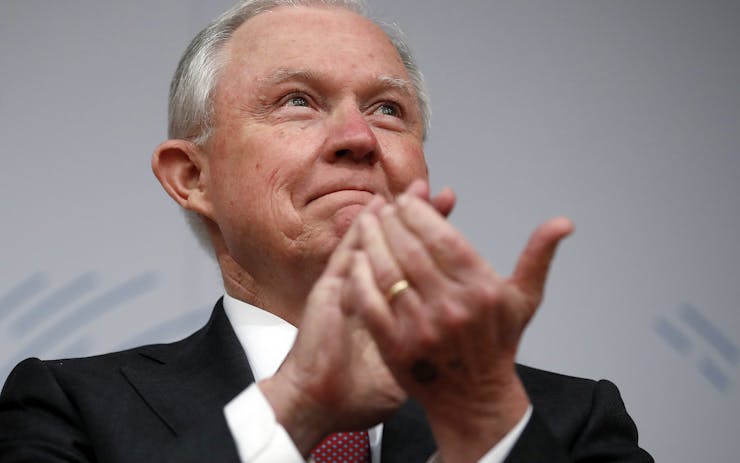Update: Late Thursday afternoon, the House passed a continuing resolution that funded the federal government through Dec. 22. An hour later, the Senate approved the resolution, which President Trump is expected to sign.
Congressional Republicans were reportedly near agreement on Thursday morning on a temporary deal that would avert a federal shutdown on Dec. 8. That’s the date that the current federal budget runs out of money. The deal under discussion would fund the government at current levels for another two weeks, through Dec. 22.
Patients will be protected in the short term. But the longer prognosis is dicey.
If that were to happen, the budget amendment known as Rohrabacher–Blumenauer (which prevents the Department of Justice from arresting and prosecuting medical marijuana patients and providers in legal states) would remain in effect through Dec. 22 as well. That’s because any continuing resolution would probably say: Same budget as last year, just extended for two more weeks.
On Wednesday, Senate and House Republican leaders seemed to be nearing consensus on a continuing resolution that would effectively bridge the budget gap for the next two weeks. The main hurdle to overcome was the party’s Freedom Caucus, which was demanding increased defense spending and budget cuts in all non-defense areas.
Politico reported on Wednesday:
If the conservative faction ultimately backs the package, it would likely seal the GOP’s hopes of avoiding the need for a last-minute deal with House Minority Leader Nancy Pelosi (D-Calif.)or Senate Minority Leader Chuck Schumer, who could demand additional concessions to keep the government open. Many Democrats are vowing to vote against government funding legislation if it doesn’t also provide deportation relief for Dreamers, the undocumented immigrants who came to the country as minors.
OK, No Shutdown. Then What Happens?
Beyond that two-week stopgap measure, though, Congress still must approve a full annual federal budget. And that’s where things get dicey for those Rohrabacher–Blumenauer protections.
The full 2018 budget won’t be written from scratch in the next two weeks. Two different versions of the budget were already passed by the respective bodies of Congress earlier this year. The Senate passed one version, while the House passed its own iteration. There are many differences between the two.
It's unclear why Rep. Pete Sessions (R-TX) blocked the patient protections, but it could be as simple as a desire to please Attorney General Jeff Sessions.
The Senate version contained the language of the Rohrabacher–Blumenauer amendment, which prohibits the Department of Justice (which includes the DEA and the FBI) from using any federal funds to arrest or prosecute anyone who abides by state regulations in states that have legalized medical marijuana.
The House version of the budget does not contain the same language, because Rep. Pete Sessions (R-TX), chair of the House Rules Committee, refused to allow the Rohrabacher–Blumenauer amendment to pass out of his committee.
In past years, Rohrabacher–Blumenauer (known in previous versions as Rohrabacher–Farr) has easily won favor on the full House floor, and the amendment is still expected to pass handily if it were presented to the full House. Sessions (no relation to Attorney General Jeff Sessions) is the only roadblock. But the committee chair position is a powerful one in Congress.
Pete Sessions has allowed previous versions of Rohrabacher–Blumenauer to pass through his committee, but this year Attorney General Sessions specifically wrote a letter to Congressional leaders requesting an end to the medical cannabis protections. “The Department,” he wrote, “must be in a position to use all laws available to combat the transnational drug organizations and dangerous drug traffickers who threaten American lives.”
It’s unclear exactly why Pete Sessions blocked the amendment this year, but the reason could be as simple as a desire to please the Attorney General.
It’s All About the Conference Committee
The fate of the Rohrabacher–Blumenauer protections will be decided over the next month by negotiators in a Congressional conference committee, where members get together to reconcile the two competing versions of the budget.
Rohrabacher-Blumenauer could survive, or it could get traded away as a bargaining chip.
It’s anybody’s guess whether Rohrabacher–Blumenauer survives that reconciliation. It could survive because of the overwhelming popular support for medical cannabis—which the latest polls put at 94%—or it could get lost amid the horse trading that goes on behind closed doors.
In a worst-case scenario, the Rohrabacher–Blumenauer protections could get dropped in this budget cycle. That would give the Justice Department, commanded by Jeff Sessions, legal room to operate against medical cannabis patients and providers.
But it’s highly likely that the amendment would be revived during the very next budget cycle, and federal judges have ruled in past cases that Justice Department prosecutors may not prosecute MMJ arrests as long as the Rohrabacher–Blumenauer protections remain in effect—even if the arrests occurred when the protections were not in effect.
In other words, if federal agents were to arrest a medical cannabis provider during a budget year that had no Rohrabacher–Blumenauer protections, that provider could seek to delay the case until the protections were re-adopted in the next budget cycle. But that, of course, takes resources. Good legal counsel costs money.





